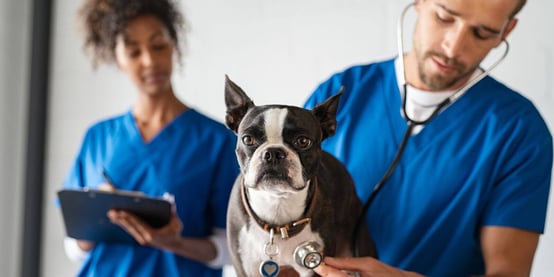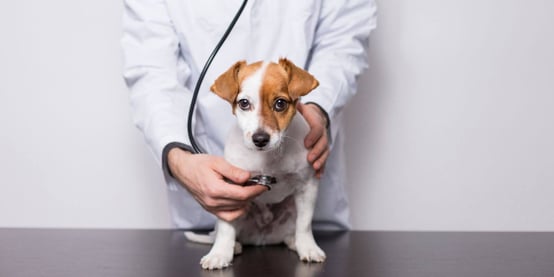One of the most common challenges a dog owner will face over the many years of companionship, from puppyhood to becoming elderly, is their dog developing diarrhea. Diarrhea is not itself a disease, rather it is a symptom or clinical sign of some other problem. It might develop with some warning, for example, the stool is getting progressively softer, or it might occur with an explosive surprise – often in the least convenient location of the home.
What Causes Diarrhea in Dogs
When dogs (and the majority of other mammals) ingest their food, the digestive journey begins in the stomach and on to the small intestine where most of the nutrients are absorbed with the assistance of “good” bacteria and then on the large intestine (colon) where most of the water is reabsorbed into the body and the soft ingesta from the small intestine is formed into firm stools and passed out the rectum. Any interruption in this delicate balance of absorption or transit time, either in the small intestine or large intestine, can lead to softer stools or outright liquid diarrhea.
The potential causes of diarrhea in dogs are almost endless. For diarrhea that would be considered acute (little or no warning of its onset) the most common and preventable would include diet changes, dietary indiscretion, intestinal parasites, and stress. Food allergies, although not nearly as common, would certainly be a strong consideration for any chronic or long-term diarrhea in an otherwise healthy-appearing dog. Fortunately, even fewer common causes for chronic diarrhea would be some unusual disease affecting intestinal absorption, which could include auto-immune disorders, cancer or a problem in another organ system which is having secondary effects on the intestinal tract (e.g. Pancreatic Disease).
What Poop Color and Consistency Says About Your Dogs Health
The form or appearance of diarrhea can often be a clue as to where the problem might lie. A stool that is loose/soft but appears to be normal in volume is most often coming from an issue with the small intestine. If the volume is much larger than normal, it is likely originating from the colon, as it has a higher water content. If the stool appears very dark and tarry, this most likely means digested blood, which points to the small intestine. If it has obvious red blood or mucous, then the colon is most likely the origin of the problem. Naturally, if you can see white worm-like segments, an intestinal parasite is the issue.
If your dog has diarrhea but you're not sure if there is blood or mucous in the mix, yet they are straining to defecate, as though they were constipated, that is a classical sign of irritation in the large bowel and rectum, so-called “colitis”. Dogs with colitis also tend to have more frequent bouts of diarrhea, often with less ability to control any accidents in the house.
An old adage in veterinary medicine when trying to determine the underlying problem behind any clinical symptom is that “the common things are common”. Suppose your dog suddenly develops diarrhea and seems healthy in all other respects. In that case, it is quite possible (probable) that they have eaten something they shouldn’t have – another pet’s food, garbage, something in the park, human food, bird seed, a sudden change in diet (the store didn’t have the regular diet)– the list is endless.
Home Remedies for Diarrhea
In situations like the one above, before rushing to your veterinarian, it is worthwhile to withhold solid food for 24 hours. Then begin feeding a combination of 50:50 boiled rice and cooked lean hamburger meat in daily portions like how the normal diet was being fed. This home-cooked diet is highly digestible and should allow the inflammation in the intestinal tract to settle down. Once the stool starts to form after a couple of days, start to slowly mix in the regular kibble or canned food that you were using before the diarrhea began. Water should always be available to prevent dehydration. One can also add Kaopectate (kaolin) to help firm the stool at a dose of 0.5 ml per pound of body weight twice a day. Kaolin will help control bacterial overgrowth of certain intestinal bacterial pathogens, as well as help protect the cells of the intestinal lining.
When You Should Contact Your Vet
Home treatment can be very helpful for acute diarrhea, but ONLY if your dog is otherwise healthy with no other clinical signs. If you notice that in conjunction with diarrhea, there is vomiting, no energy, depression, or lack of appetite then this is NOT a scenario to try a home remedy. In cases like this, you need to take your dog to see your veterinarian as soon as possible. Simple cases of diarrhea in dogs only result in diarrhea. The fear is that, if there are other clinical signs accompanying diarrhea, then something more serious is at play. For example, when getting into the garbage, did your dog eat a portion of corn cob, a bone or something else that is causing an intestinal obstruction? Such a consequence could be life-threatening in a very short period of time.
In situations where diarrhea has been going on for quite some time – many days, weeks or even months – either perpetually or intermittently, then that would be classified as chronic. The stool may or may not have blood or mucous in it and your dog may well have remained bright and alert; happy in almost all respects, but home treatment was not successful. The time has come to have the problem checked out by your veterinarian. Diagnostic tests will undoubtedly be necessary – including stool analysis for intestinal worms (e.g. Roundworms) or protozoa (e.g. Giardia), blood tests to rule out other organ involvement (e.g. pancreatic enzyme deficiency or Cushing’s disease), food elimination diet trails to check for food allergies, stool bacterial cultures (e.g. to rule out Salmonella) and in some cases even intestinal biopsies to rule out auto-immune disease (e.g. inflammatory bowel disease).
Preventing Diarrhea in Dogs
Having diarrhea is no fun for you or your dog and ideally one should make every effort to prevent the “simple” cases. Tips would include:
- Ensuring your dog never has access to garbage, especially on garbage pick-up days, if you live in a municipality where this service is available.
- When changing diets to a new food, do so slowly over about 7 days, gradually mixing in the new food, while slowly removing the old food from the mix.
- Whenever your dog is off lead, supervise them carefully, in case they encounter something toxic or tempting while wandering about you.
- Deworm your dog for intestinal parasites regularly. Most monthly medications to prevent fleas, ticks and heartworms include medications that help prevent intestinal parasites. Dogs can easily be infected by certain intestinal parasites that penetrate through the skin of the foot pads while walking through parks.
- If your dog is known to develop diarrhea in response to stressful situations, e.g. boarding, try to find an alternative solution to the stressful situation.
- Ensure your dog is up to date on vaccinations, as viral diarrhea (Parvovirus) is life-threatening and easily prevented.
Unfortunately, owners would rarely be able to have any control over chronic forms of diarrhea or diarrhea that accompanies some other serious illness. These cases need to be seen by your veterinarian. If your dog is unwell, the sooner you arrange for this check-up, the better.



